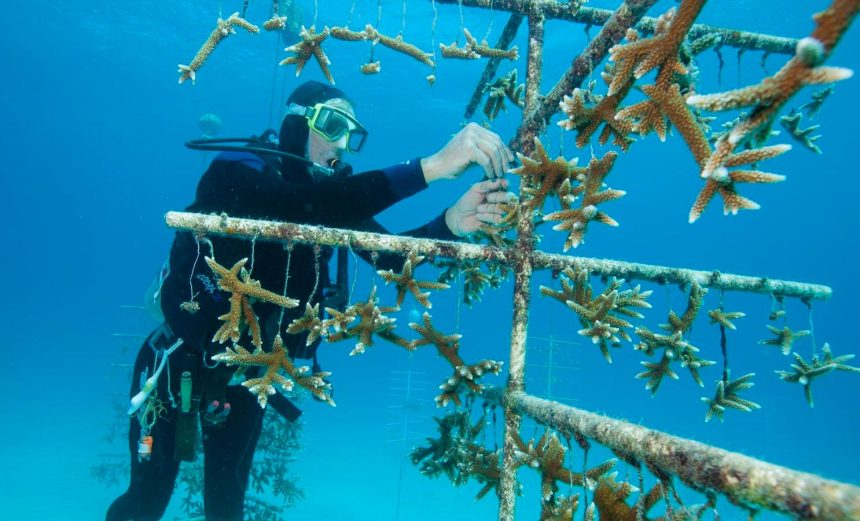Coral reefs, often hailed as the rainforests of the sea, provide a multitude of ecological and economic benefits. A recent study conducted by the U.S. Geological Survey (USGS), the University of California at Santa Cruz, and the National Oceanic and Atmospheric Administration (NOAA) highlights a crucial service provided by these vibrant ecosystems: coastal protection. The research emphasizes the potential of coral reef restoration as a cost-effective, nature-based solution to mitigate the devastating impacts of coastal flooding and erosion, particularly in vulnerable regions like Florida and Puerto Rico. By acting as natural barriers, reefs absorb wave energy, reducing the force of storm surges and protecting coastal communities and infrastructure. This natural defense mechanism not only safeguards lives but also offers substantial economic advantages, potentially saving millions of dollars annually in damage and lost economic activity.
The study underscores the critical role coral reefs play in dissipating wave energy. When powerful storm waves encounter a healthy coral reef, the intricate structure of the reef acts as a natural breakwater. The reef absorbs a significant portion of the wave’s energy, reducing its height and velocity before it reaches the shoreline. This natural buffering effect minimizes the impact of flooding and erosion, protecting coastal properties, businesses, and critical infrastructure. Without the presence of healthy reefs, coastal areas are left exposed to the full force of storms, resulting in increased damage, displacement of communities, and significant economic losses. The study quantifies these benefits, demonstrating that restoring degraded reefs in Florida and Puerto Rico alone could protect nearly 3,000 people annually and prevent over $391 million in damages.
The research advocates for a shift in focus from artificial coastal defenses to nature-based solutions like coral reef restoration. Traditional approaches to coastal protection often involve constructing man-made structures such as seawalls and levees. While these structures may offer some level of protection, they often come with significant environmental drawbacks. They can disrupt natural sediment flow, degrade habitats, and ultimately exacerbate erosion in other areas. Furthermore, these static structures are ill-equipped to adapt to rising sea levels and changing climate conditions. In contrast, coral reefs are dynamic, living systems that can grow and adapt to changing sea levels, providing a more resilient and sustainable form of coastal protection.
The economic benefits of coral reef restoration extend beyond flood protection. Healthy coral reefs support a thriving ecosystem that provides numerous economic benefits, including tourism, recreation, and fisheries. Coral reefs attract divers, snorkelers, and other tourists, generating revenue for local businesses and supporting coastal economies. They also provide habitat for a diverse array of fish species, supporting commercial and recreational fisheries. The economic value of these services is substantial, further strengthening the case for investing in reef restoration. The study highlights the need to consider these broader economic benefits when evaluating the cost-effectiveness of reef restoration projects.
The decline of coral reefs worldwide, including in Florida and Puerto Rico, poses a significant threat to coastal communities and economies. Factors such as pollution, overfishing, coastal development, and climate change have contributed to widespread coral bleaching and reef degradation. In Florida, for instance, decades of human activity have led to a dramatic decline in coral cover. The loss of these natural barriers leaves coastal areas increasingly vulnerable to the impacts of storms and sea-level rise. The study’s findings emphasize the urgent need to address these threats and invest in coral reef restoration as a critical strategy for protecting coastal communities and ensuring their long-term resilience.
Investing in coral reef restoration represents a proactive and sustainable approach to coastal protection. By restoring these natural defenses, we can safeguard coastal communities, protect vital infrastructure, and support thriving coastal economies. The study’s findings offer compelling evidence of the substantial economic and societal benefits of coral reef restoration, demonstrating that investing in nature-based solutions can be a highly cost-effective strategy for mitigating the impacts of climate change and ensuring the long-term health and resilience of our coastal communities. It calls for a shift in policy and funding priorities, emphasizing the need to invest in natural infrastructure alongside, or even in preference to, traditional engineered solutions. This approach recognizes the inherent value of healthy ecosystems and their crucial role in protecting human communities and supporting sustainable economic development. By valuing and investing in natural infrastructure, we can build more resilient coastal communities and create a more sustainable future for all.



